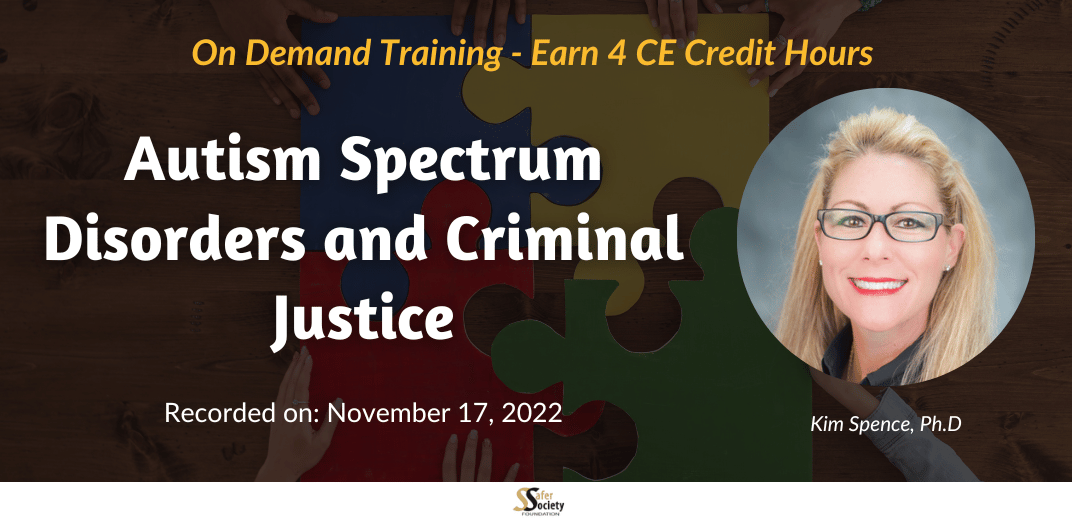
Autism Spectrum Disorders and Criminal Justice
Already purchased an On Demand training?
Click here to access your Safer Society On-Demand Training Center account.
Individuals with autism spectrum disorders (ASD) continue to become embroiled in tragic and often preventable circumstances necessitating intensive criminal justice system involvement. This happens despite the exhaustive efforts of parents, educators, advocates, therapeutic providers, and professionals within the criminal justice system. According to current estimates of the CDC’s Autism and Developmental Disabilities Monitoring Network, one in 45 adults in the United States are identified with ASD. This makes ASD one of the most frequently occurring developmental disabilities in the United States. Autism remains undiagnosed for many individuals for a variety of reasons, yet it occurs frequently within all racial, ethnic, and socio-economic groups and is five times more likely to affect males.
While many states now require law enforcement professionals and members of the criminal justice system to receive annual training about ASD, these overviews are often inadequate and frequently fail to assist criminal justice personnel in understanding and supporting clients with ASD. Moreover, there is a significant scarcity of forensic personnel who understand ASD, leaving those on the spectrum at increased risk of victimization and ineffective rehabilitative programming.
Participants in this online training with Dr. Spence, a world-renown expert in the treatment and assessment of justice-involved people with autism, receive detailed information about ASD along with documented case examples that illustrate the consequences facing ASD clients within the criminal justice system and practical strategies for identifying characteristics of ASD in non-diagnosed clients. The training includes information about current literature regarding comorbid disorders and disparities in diagnoses among minority groups. Participants will also receive practical suggestions for preventing ASD clients from violating the law and strategies for intervening with ASD clients who have violated the law.
1) Summarize the symptoms of autism spectrum disorder (ASD) according to the DSM-5
2) Describe current trends in peer-reviewed literature/research related to individuals with autism spectrum disorder (ASD) who become involved with the criminal justice system
3) List specific evidence-based standardized assessment tools utilized in diagnosing autism spectrum disorder (ASD)
4) Recognize the differences between sexual behavior problems associated with autism spectrum disorder (ASD) versus the presentation of other mental health disorders
5) Describe several evidence-based, therapeutic intervention strategies recommended for clients with ASD who engage in problematic and/or illegal behavior
Audience
This training is for professionals working with people who have who have perpetrated abuse. Professionals who will benefit from this training include social workers, psychologists, clinical counselors, and interested paraprofessionals.
Content Level
Disclosure
Continuing Education Approval
American Psychological Association (APA)
Safer Society Foundation, Inc. is approved by the American Psychological Association (APA) to sponsor continuing education for psychologists. Safer Society Foundation, Inc. maintains responsibility for this program and its content.
Who's Presenting

Kim Spence, PhD
Dr. Kim Spence is the Clinical Director of Autism Support Services for Specialized Treatment & Assessment Resources and has worked for the Center for Autism and Related Disabilities (CARD) at the University of Central Florida (UCF) since 1999. For the past 20 years she has lectured internationally regarding treatment supports, targeted therapeutic intervention, and the creation of specialized sexuality education programs for individuals with autism spectrum disorders (ASD). Dr. Spence began providing sexuality education training for parents, teachers, and care providers of individuals with ASD in 2000 and has offered numerous trainings focused on the creation of specialized educational, social, and behavioral interventions to support healthy sexual knowledge for individuals with ASD across the life-span. She has been training emergency responders, law enforcement personnel, and members of the criminal justice system since 2001 and serves as a consulting editor for the journal Intellectual and Developmental Disabilities (IDD) and on the editorial review board of the Journal of Vocational Rehabilitation (JVR).
